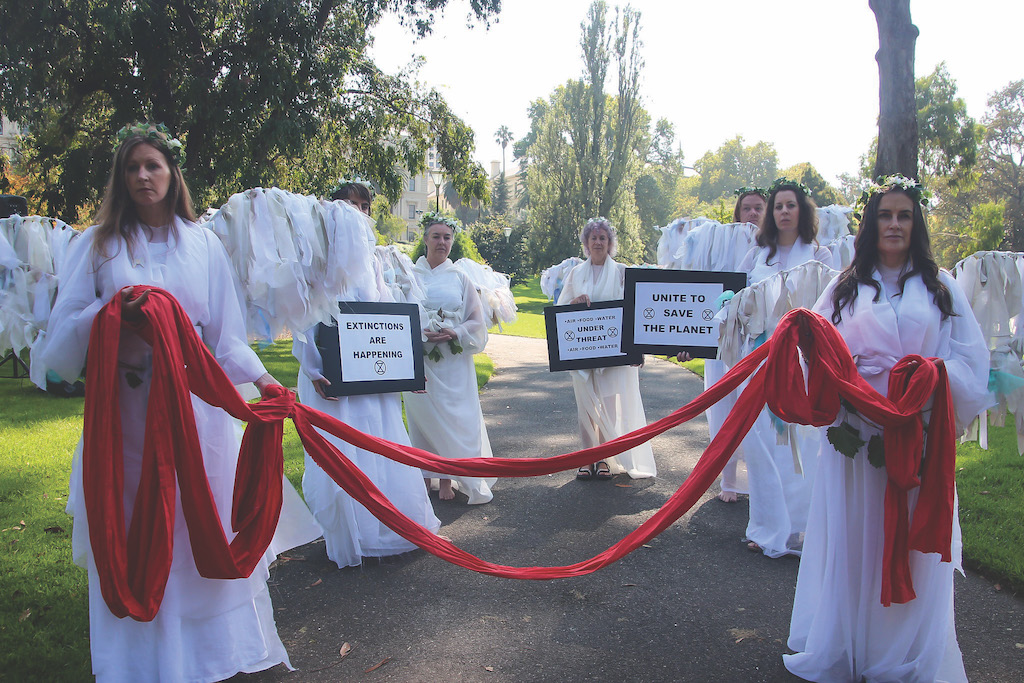A new climate change movement, known as the Extinction Rebellion, is on the rise in European countries—the most recent protests in Central London resulted in the arrest of over 1,000 protesters.
The Extinction Rebellion—a rebellion aiming to raise awareness regarding climate change—was formed in October 2018. The movement, influenced by Swedish teenager Greta Thunberg who gained attention when she held climate change protests at her high school, uses nonviolent civil disobedience tactics to spread their message.
With the effects of climate change increasing, the movement demands immediate action. With some protesters wearing red robes and white face paint, Extinction Rebellion members blocked major roads for seven minutes at a time and demanded politicians take action against global warming at the most recent protests on April 15.
Protesters across the country laid down in shopping malls and busy areas. Several held signs that read, “Are we next?” Some young adults and children carried signs with photos of different endangered species whose existence is threatened by climate change. Several youth organizations who are associated with the Extinction Rebellion, including the Wee Rebellion, participated in the protests on April 15.
“We know we have disrupted your lives,” the Extinction Rebellion said in a written statement. “We do not do this lightly. We only do this because this is an emergency.”
Protesters have said they will continue to stage what they call “die-ins” across France, Australia, New Zealand, Finland, Sweden, Norway, Italy, the Netherlands and the United Kingdom until local and central governments commit to zero greenhouse gas emissions within 11 years and establish citizen assemblies to initiate changes that will reduce the effects of climate change.
The protesters in London have asked the government to set a goal to eliminate all carbon emissions by 2025. They also asked politicians to declare a state of emergency and to “tell the truth” about climate change.
“We’re hoping that the political class wakes up because if they don’t, the next thing that will happen will be much more dramatic,” Roger Hallam, a founder and organizer of the Extinction Rebellion movement told The Guardian.
Protesters have formed blockades in the streets, glued themselves to the entrance of the London Stock Exchange and chained themselves to British politician Jeremy Corbyn’s house.
Protesters were unfazed when they were told they would be arrested, and several did not fight back and peacefully went into custody. One activist Cleo Peterson said, “I want it on my record as a human being.”
Several police officers’ days off were canceled in order to balance the protests. The government claimed the demonstrators disrupted the lives of many Londoners. Several citizens who are not involved with the Extinction Rebellion joined the protests.
“It’s my first time swarming, but I’m out here because we have a climate and ecological crisis,” August Hall from North London told The Guardian. “I’ve been with Extinction Rebellion all week and have been inspired by the way they do things, the non-violence, the support of protesters when they’re being arrested and the focus on love of the planet.”
Several celebrities were seen at the protests as well. Actress Emma Thompson joined activists in the centre of Oxford Circus, and Olympic medal winning canoeist Etienne Stott was spotted at the protests on the Waterloo Bridge. Stott was arrested for his involvement in the protests but was later released pending police investigation.
“We have seriously failed them, and our planet is in serious trouble,” Thompson said at a speech from Berta Cáceres. “We have much, much less time than we thought. I have seen the evidence for myself, and I really care about my children and grandchildren enough to want to be here today to stand with the next generation.”
At a ceremony in Hyde Park to signal the end of the protests, leaders told people to “go back to their communities” but to expect more demonstrations soon. British Environment Minister Michael Gove said the activists’ “point had to be made” and acknowledged it was time for “a serious conversation about what we can do to collectively deal with [climate change].”






